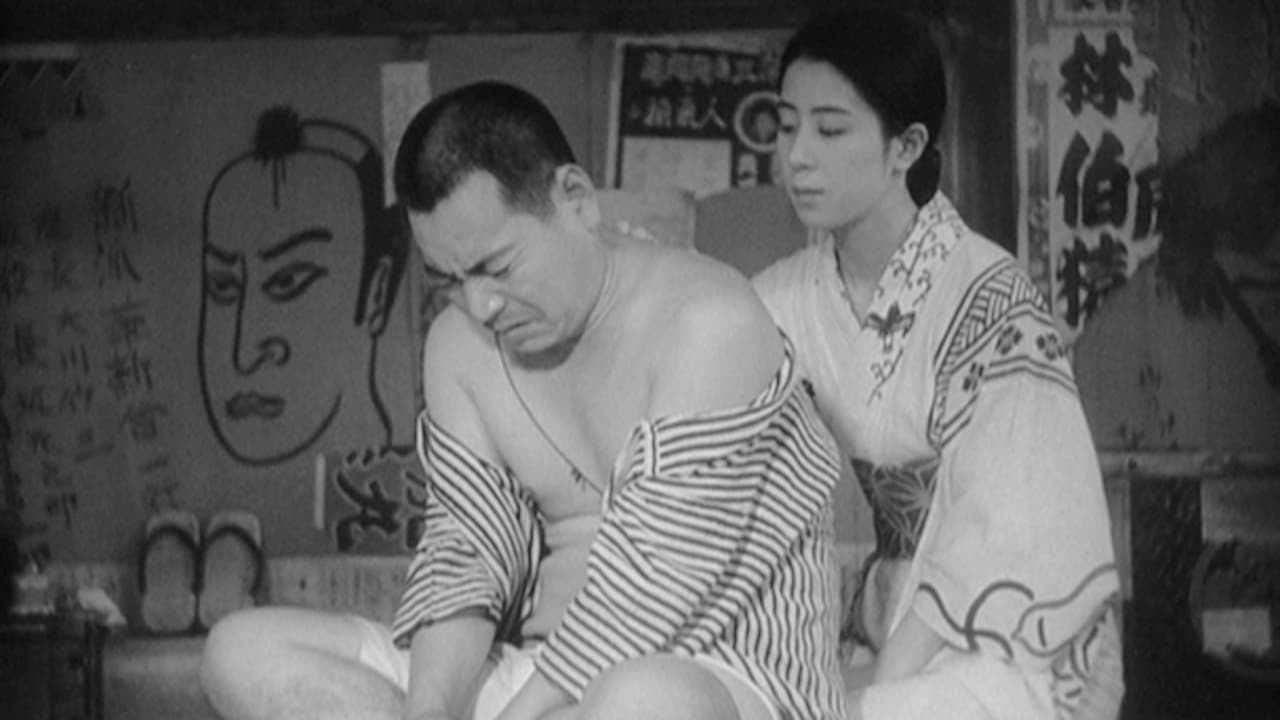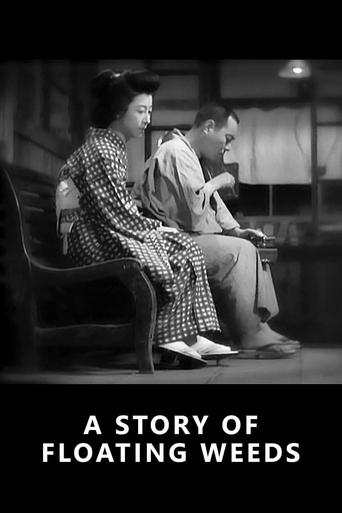ada
the leading man is my tpye
Hulkeasexo
it is the rare 'crazy' movie that actually has something to say.
Freeman
This film is so real. It treats its characters with so much care and sensitivity.
Haven Kaycee
It is encouraging that the film ends so strongly.Otherwise, it wouldn't have been a particularly memorable film
Flak_Magnet
This early career (1934) Yasujuro Ozu silent film is a personal favorite. A seminal work for Ozu, "A Story of Floating Weeds" is a remarkably modernist, concise film, and the story is powerfully moving. This picture is often argued as Ozu's first fully-realized, and it is an easy film to appreciate, with Ozu's quiet artistry on showcase throughout. (The patent imagery is here: laundry on lines, silent stairwells, passenger trains, hanging lights, etc.; as well as the simplistic, low-angle shooting style, resulting in a film that feels much more familiar to Ozu fans than its age would indicate. Established Ozu fans should notice some outliers, though, including realistic domestic violence and several moving dolly shots). The storyline involves a downtrodden traveling theater group, whose manager is reuninted with his estranged "nephew," (who is, in actuality, his son) and the young man's mother. What follows is a quiet, somber story of familial bonds, unrealizeable love, and the often impossible nature of personal happiness. It is also very much a film about the lower classes, whose plight is subject for this, Ozu's first metaphorical title. The "Floating Weeds" refers to duckweed, a floating plant often referenced in Japanese poetry, and it is emblematic of aimlessness, and the drifting lack of meaning in life. "A Story of Floating Weeds" is a movie about the flatsom and jetsom of Japanese society, whose destination is open to chance and whim. Perhaps equally importantly, "Floating Weeds" is a story about fathers and sons. It is timeless, fundamental stuff, and I'd argue some of Ozu's best.
Michael_Elliott
Story of Floating Weeds, The (1934) ** 1/2 (out of 4) A traveling actor returns to a town where his his old flame lives, which causes complications with his current girlfriend and the son who doesn't know he's the father. This was my first film by Yasujiro Ozu and I'm really not sure the reputation this one has over the remake but this here really didn't work for me. The story never fully grabbed my attention and I must say that some of the dialogue was pretty lame, although I've heard some Japanese words don't translate very well to English so perhaps this had something to do with it. The visual style of the film is really the only thing that kept me awake. The stark photography and lush blacks really look terrific and the simple direction also works well.
MartinHafer
For a movie released in 1934, it is very odd that this is a silent film. While I love Japanese cinema and have seen many, many movies from this country, this is about the oldest one I have seen and couldn't understand it being silent. Perhaps they were just VERY far behind in switching to "talkies"--although even in Europe, Sound movies were pretty much the norm by about 1931 or so.Apart from this odd feature of the film, I found it to be almost a carbon copy of the remake of this film that the director made 25 years later. In fact, they were so similar, I really didn't find it all that necessary to have seen both. This, combined with the better technical merits, make the remake a better viewing experience for the average viewer--though film historians and cinephiles will probably be interested in both versions. Fortunately, the Criterion release includes BOTH versions! What a deal! The story is a melancholy tale of an itinerant actor who owns a troop of small-time actors. After many years, he returns to a small town where his illegitimate son lives with his birth mother. The boy, now nearly a full-grown man, thinks that the actor is his uncle--a ruse that has been perpetuated all his life. While I could discuss this central relationship further and discuss the twists and turns the plot takes, it would be best you see it for yourself. It is a rewarding and sad tale that involves regrets, responsibility and "what might have been"--just the sort of movie that makes you think and doesn't give easy answers. An excellent film well worth seeing.
Galina
"A Story of Floating Weeds" (1934) was the second Yasujiro Ozu's film I've seen. Like with "Tokyo Story", I kept asking myself, why the film that was made so many years ago about the people who lived so far away in the world I don't know much about is so wonderfully engaging? Why was I so drawn to the characters of this human drama? The story is simple: an aging, traveling actor who is the manager of a kabuki troupe returns to a remote village where he secretly meets his former lover and her 19 year old illegitimate son, to whom he is known as "uncle." The older man finds happiness in communicating with his son who turned to be a fine young man. His current mistress, filled with jealousy because of his attachment to his secret family, hires a young beautiful girl, the member of a troupe to seduce a boy.Directed by the great director and humanist with elegant simplicity, genuine interest to his characters and restraint, this moving film is never melodramatic or manipulative.I liked the music score written specially for the film in 2004. I tried to watch it silent but it would take me more than one viewing to get used to no music score at all.Seems that Ozu valued the film and thought about it a lot - he himself made a remake in color and sound 25 years later.

